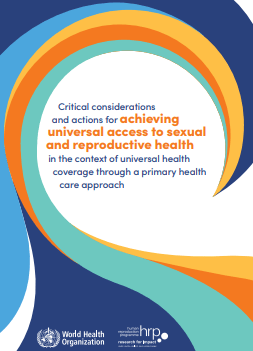Critical Considerations and Actions for Achieving Universal Access to Sexual and Reproductive Health in the Context of Universal Health Coverage Through a Primary Health Care Approach
The goal of “Critical Considerations and Actions for Achieving Universal Access to Comprehensive Sexual and Reproductive Health in the Context of Universal Health Coverage through a Primary Health Care Approach” is to offer guidance to WHO Member States regarding how to ensure progress towards universal access to comprehensive sexual and reproductive health (SRH) in the context of policy and strategy changes related to primary health care (PHC) and universal health coverage (UHC). It is designed for those involved in ensuring that everyone has access to SRH services under national programs, particularly in light of UHC initiatives.
By having Universal Health Coverage (UHC), all people and communities are guaranteed access to the medical care they require without facing financial hardship. It covers the complete range of necessary, high-quality health services, from wellness promotion through treatment, palliative care, and prevention across the lifespan.
This study found that the neglect of disadvantaged groups’ health is frequently caused by ingrained gender and social norm disparities and asymmetries. Additionally, interventions from several fields outside of health are necessary for the successful prevention of gender-based violence. The danger of prolonged service exclusion and subpar care also exists for elderly persons, migrants, ethnic minorities, refugees, and mobile populations. Poor sexual and reproductive health-seeking behaviors are made worse by discrimination and bias that shows up in the options, recommendations, and standard of care offered, while also violating a number of human rights.
The broader understanding of this study is that, a constrained, conventional view of health systems cannot support the global SRHR practices. Therefore, it is crucial to take into account a flexible and context-specific strategy that respects sociopolitical ideas without infringing on people’s rights as individuals. Strengthening the health system and the larger political, economic, social, cultural, and gender context are prerequisites for achieving UHC and guaranteeing that everyone, including vulnerable populations, receives quality, rights-based, non-discriminatory SRHR services without suffering financial hardship.
Click the button below to download the full paper:
Download WHO – Actions for Comprehensive SRH in the Context of UHC
Source: World Health Organization


